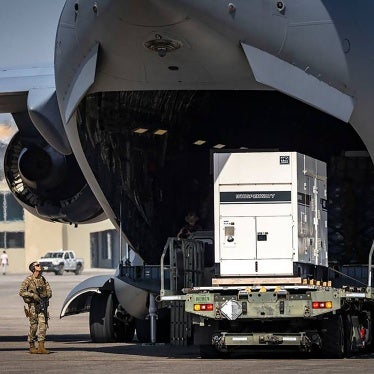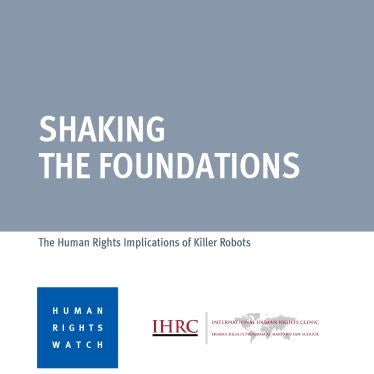(Washington, DC) – The United States should act on its recent condemnation of Syria’s use of antipersonnel landmines by joining the international ban on these weapons, Human Rights Watch said today. A “Lend Your Leg” call to action against landmines is taking place around the world on April 4, 2012 on the International Day for Mine Action and Mine Awareness.
As part of the “Lend Your Leg” call, people all over the world – including the UN secretary-general and numerous politicians and celebrities – are rolling up their trouser legs in solidarity with landmine survivors and in support of a mine-free world. The International Campaign to Ban Landmines (ICBL), recipient of the Nobel Peace Prize, is teaming with the UN and others in dozens of events against landmines and for the 1997 Mine Ban Treaty.
“The United States should recognize that antipersonnel landmines are no longer acceptable weapons, but relics of the past,” said Steve Goose, arms director at Human Rights Watch. “It’s time for President Obama to make a decision on US landmine policy, and we expect him to support a ban.”
The United States is not a party to the 1997 Mine Ban Treaty, which comprehensively prohibits antipersonnel landmines and requires their clearance and assistance to victims. Yet the US already follows most of the treaty’s key provisions and has condemned new use of landmines by others. On March 14, US Ambassador Susan Rice and the State Department both described reports of Syria’s use of antipersonnel mines on its borders with Lebanon and Turkey as “horrific.”
The US began a comprehensive landmine policy review in late 2009. Over the course of the review, the administration has received letters of support for the landmine ban from 68 Senators, 16 Nobel Peace Prize Laureates, key NATO allies, retired senior military personnel, dozens of leaders of nongovernmental organizations, victims of US landmines, and members of the public. Apparently, inter-agency deliberations have concluded and the policy review has reached the decision-making point.
“By now it should be abundantly clear to President Obama that it is possible for the US to meet its national defense needs and security commitments without antipersonnel mines,” Goose said. “There are minimal costs and maximum benefits to the US joining the Mine Ban Treaty.”
The US has not used antipersonnel mines since 1991, in the first Gulf War, has not exported them since 1992, and has not produced them since 1997. It is also the biggest donor to mine clearance and victim assistance programs around the world. But it still stockpiles millions of antipersonnel mines for potential future use.
The US was the first nation to call for the “eventual elimination” of antipersonnel mines at the UN in September 1994. Under the Clinton administration, the US participated in the Ottawa Process, which led to the creation of the Mine Ban Treaty. But the US did not sign in 1997, and instead set the objective of joining the treaty in 2006. The Bush administration reversed course in February 2004 and announced that the US would never join the treaty.
Until the current policy review is completed, the 2004 Bush policy remains in place, permitting the US to use self-destructing, self-deactivating antipersonnel mines anywhere in the world. In accordance with this policy, the US no longer uses antipersonnel mines that do not self-destruct – sometimes called “persistent” or “dumb” mines – anywhere in the world, including in Korea. It is in the process of destroying its stockpile of more than one million of these mines.
The Mine Ban Treaty prohibits all antipersonnel mines regardless of whether they have self-destruct features, as they are equally indiscriminate. The 161 countries that have joined the Mine Ban Treaty include every other NATO member and allies such as Afghanistan, Iraq, and Australia. Under the terms of the treaty, the US should not use antipersonnel mines in joint military operations with these countries, which are prohibited from assisting with mine use and other acts banned by the treaty.
Human Rights Watch is a founding member of the International Campaign to Ban Landmines, which received the 1997 Nobel Peace Prize for its efforts to bring about the Mine Ban Treaty and for its contributions to a new international diplomacy based on humanitarian imperatives. The campaign was established by six nongovernmental organizations at the New York offices of Human Rights Watch 20 years ago, in October 1992.








